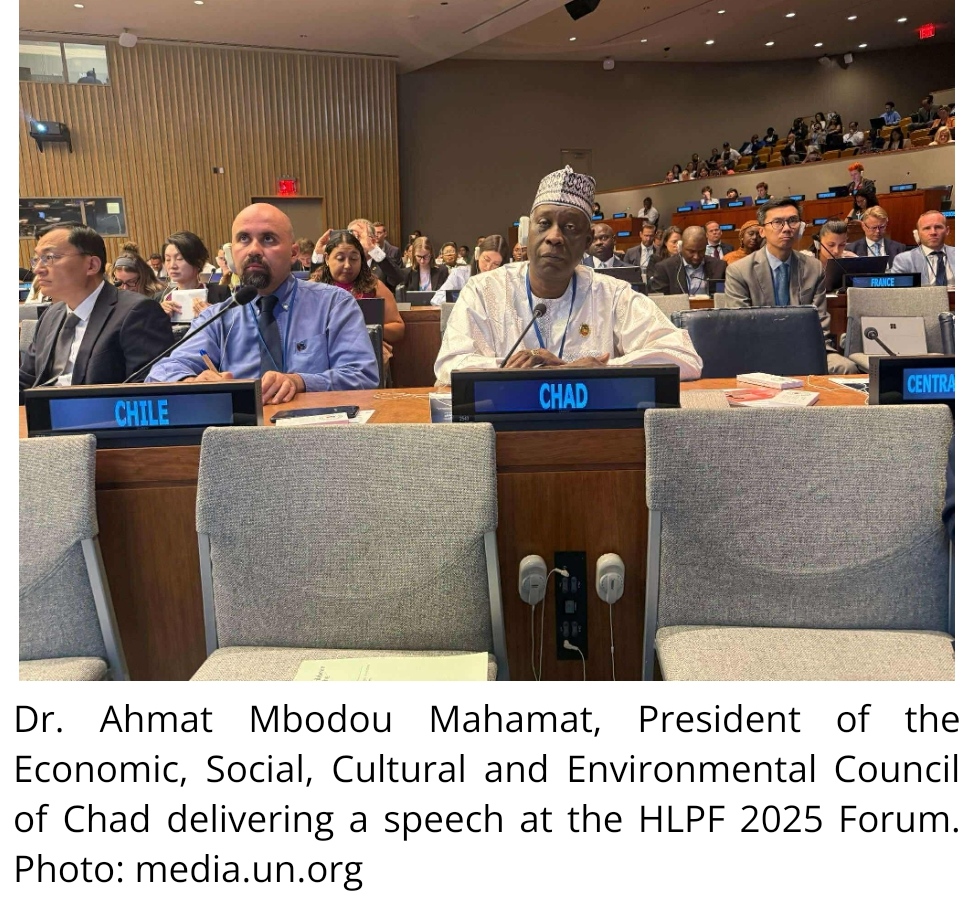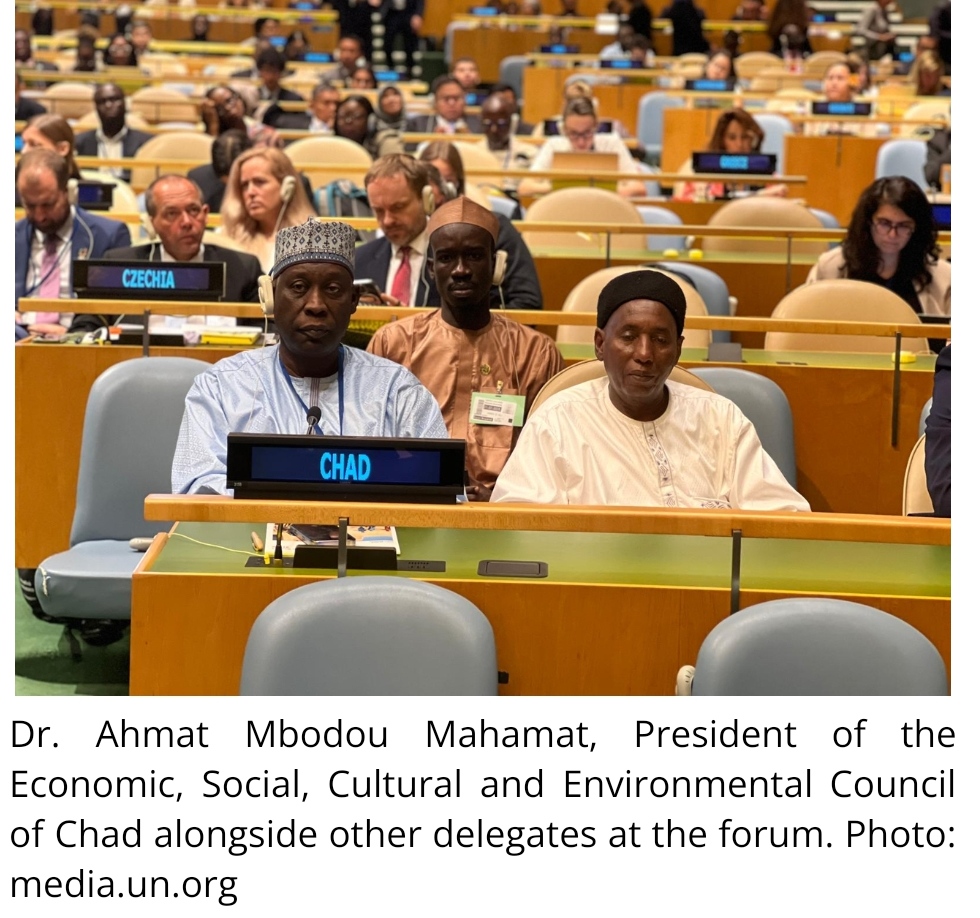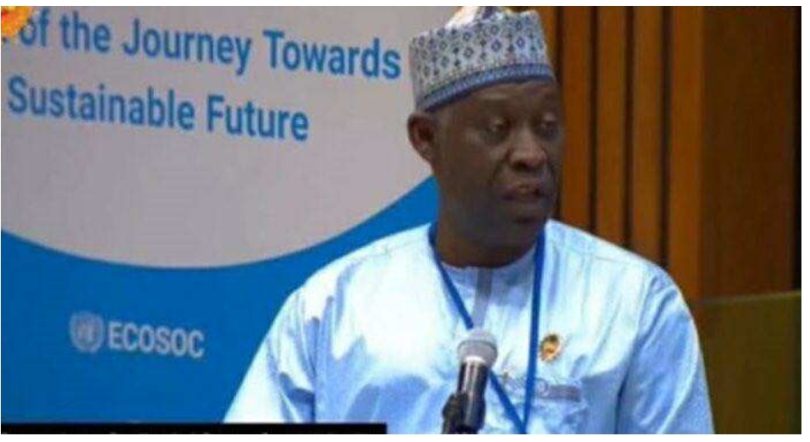At the 2025 High-Level Political Forum on Sustainable Development, Chad’s government made an important statement, offering a clear view of national efforts and challenges in implementing the Sustainable Development Goals. The presentation reflected both the determination of national authorities and the realities facing developing countries in a complex global environment.
The Forum took place from 14 to 23 July 2025 under the auspice of the United Nations Economic and Social Council. Leaders from governments, multilateral institutions, civil society, and academia gathered to evaluate progress on the 2030 Agenda. Thirty-seventh countries participated in the review process.
Representing the country, Dr. Ahmat Mbodou Mahamat, President of the Economic, Social, Cultural and Environmental Council of Chad, delivered remarks on behalf of the government. He opened by reaffirming the country’s commitment to the Sustainable Development Goals.

This meeting offers a timely and vital opportunity,” he said. “It is a chance to renew our commitment to the principles enshrined in the United Nations Charter and to confront emerging challenges through inclusive, innovative solutions.”
Chad has submitted three national reviews since the adoption of the 2030 Agenda. The most recent report provides an updated assessment of policy implementation and highlights the areas that require more attention. According to the report, the government has prioritized policies that reach vulnerable groups, improve public institutions, and strengthen resilience to shocks. Authorities have placed particular focus on the principle of leaving no one behind.
In his speech, Dr. Mahamat described the country’s political transition as a turning point. Following a peaceful process, Chad restored constitutional order in 2024. The government believes that renewed political stability can help unlock greater investment, improve planning, and strengthen service delivery. Dr. Mahamat added that Chad continues to host refugees and displaced populations from neighboring countries, showing solidarity even as it manages its own development needs.

The national review also examined environmental risks and the country’s vulnerability to climate change. Officials acknowledged that although Chad has taken steps toward adaptation, the country is still far from meeting its climate goals. Recurring droughts, soil degradation, and the continued shrinking of Lake Chad remain serious concerns. Dr. Mahamat noted that addressing these challenges requires a stronger global response and more targeted support for countries affected by climate extremes.
Looking ahead, the government plans to organize a series of high-level financing roundtables in September. These discussions will be held in Dubai and are expected to bring together international partners, development agencies, and private sector stakeholders. The aim is to mobilize new resources and identify practical solutions for financing Chad’s national development priorities.
Dr. Mahamat also spoke about the importance of multilateralism. He encouraged partners to increase their support for countries facing complex and interconnected risks. “Our progress has been impeded by internal conflicts and regional instability, which have placed additional strain on our development trajectory,” he said. “Yet we remain confident that strengthened international cooperation and increased global solidarity will help us move forward.”
Across the Forum, similar perspectives were shared by other countries facing systemic constraints. Many emphasized the need for better access to data, more flexible funding mechanisms, and closer coordination between national and international actors. Participants also stressed the importance of ensuring that development planning includes youth, women, and civil society representatives.
Chad’s declaration highlighted how countries in transition are working to rebuild public trust, restore effective governance, and improve the delivery of essential services. The report emphasized local participation as a key factor in driving results and aligning national actions with the global goals.
Dr. Mahamat closed his address with a call for deeper partnership. “We call upon the international community to scale up support and engagement with countries in special situations,” he said. “Together, we can work in shared purpose to deliver on the promise of the 2030 Agenda.”
As the international community approaches the final five years of the Sustainable Development Goals timeline, Chad’s assessment offers a clear perspective on the path forward. National progress is possible, but it requires continuous collaboration and the willingness to support countries facing the greatest risks and burdens.








